人教新目标(Go for it)版九年级英语上册 期中达标测试卷(含详细解答)
人教新目标(Go for it)版九年级英语上册 Unit 8 达标测试卷(含详细解答)

人教新目标(Go for it)版九年级英语上册 Unit 8 达标测试卷(限时: 45分钟满分: 100分)班级:姓名:得分:一、单项选择。
(每小题2分,共20分)1. [易错题]The pink hairband must belong to ____.A.Linda's B.LindaC.hers D.she2. If the weather is nice, we could have a(n) ____ in the park.A.picnic B.chanceC.place D.idea3. —Difficulties always go with me!—Cheer up! If God closes a door in front of you, there ____ be a window opened for you.A.may B.couldC.must D.can't4. —Do you know the saying “Lost years are worse than lost dollars”?—Yes, it tells us that nothing is more ____ than time.A.terrible B.valuableC.educational D.ordinary5. [易错题]—I ____ a strange gift yesterday, and I still don't know who it was from.—Maybe it's from me. Aha!A.took B.acceptedC.received D.bought6. —Who would you like to study with, Mary?—____. I don't mind.A.Somebody B.EverybodyC.Anybody D.Nobody7. —What beautiful handwriting(书法)! I wonder ____ notebook this is.—It must be Lin Feng's.A.which B.whatC.whom D.whose8. Bill is a strong-minded boy. He said nothing could prevent him ____ his dream.A.achieve B.to achieveC.achieved D.achieving9. The meeting was held ____ the purpose of discussing how to solve the problemscaused by the floods.A.for B.ofC.about D.under10. —Is Grace the right person to translate the article?—____. She is good at both English and French.A.Good luck B.Don't worryC.You're joking D.I guess so二、完形填空。
人教新目标(Go for it)版九年级英语上册 Unit 9 达标测试卷(含详细解答)
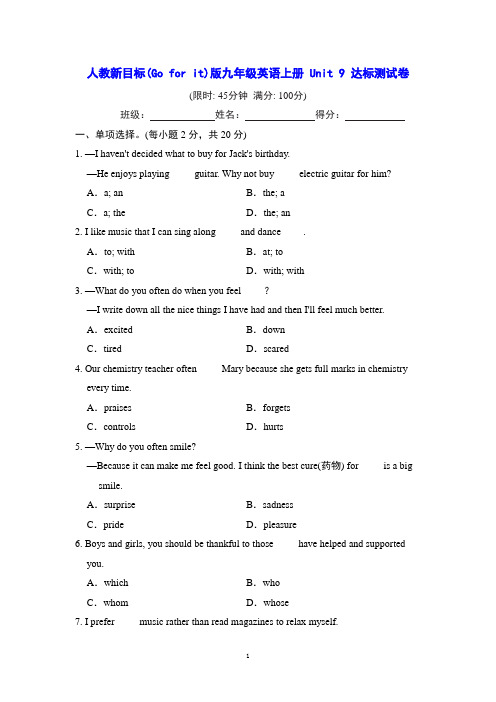
人教新目标(Go for it)版九年级英语上册 Unit 9 达标测试卷(限时: 45分钟满分: 100分)班级:姓名:得分:一、单项选择。
(每小题2分,共20分)1. —I haven't decided what to buy for Jack's birthday.—He enjoys playing ____ guitar. Why not buy ____ electric guitar for him?A.a; an B.the; aC.a; the D.the; an2. I like music that I can sing along ____ and dance ____.A.to; with B.at; toC.with; to D.with; with3. —What do you often do when you feel ____?—I write down all the nice things I have had and then I'll feel much better.A.excited B.downC.tired D.scared4. Our chemistry teacher often ____ Mary because she gets full marks in chemistryevery time.A.praises B.forgetsC.controls D.hurts5. —Why do you often smile?—Because it can make me feel good. I think the best cure(药物) for ____ is a big smile.A.surprise B.sadnessC.pride D.pleasure6. Boys and girls, you should be thankful to those ____ have helped and supportedyou.A.which B.whoC.whom D.whose7. I prefer ____ music rather than read magazines to relax myself.A.listening B.to listen toC.listen D.listened8. —Both the T-shirt and the skirt look nice on you. How much did they cost?—50 dollars ____.A.in fact B.at firstC.in total D.at least9. It's reported that there will be ____ snow in most northern parts.A.plenty of B.a number ofC.kind of D.the number of10. —Our teacher says that we won't have a school trip this weekend.—____ I know you have been looking forward to it.A.Don't worry about it!B.Enjoy yourselves!C.Never mind.D.What a pity!二、完形填空。
人教新目标(Go for it)版九年级英语上册 Unit 4 达标测试卷(含详细解答)
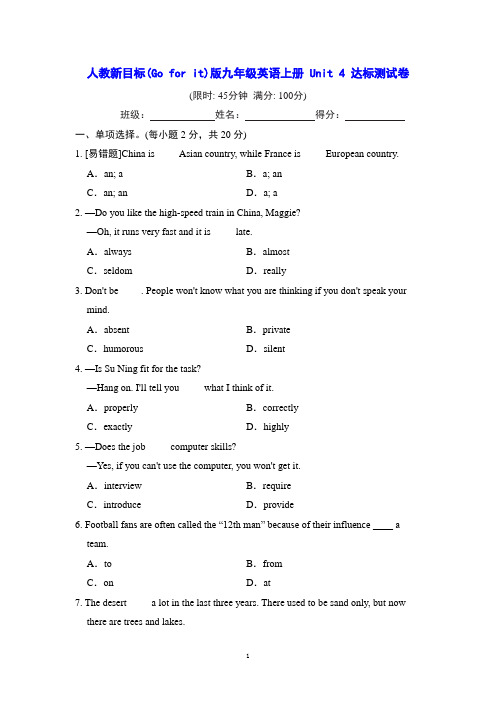
人教新目标(Go for it)版九年级英语上册 Unit 4 达标测试卷(限时: 45分钟满分: 100分)班级:姓名:得分:一、单项选择。
(每小题2分,共20分)1. [易错题]China is ____ Asian country, while France is ____ European country.A.an; a B.a; anC.an; an D.a; a2. —Do you like the high-speed train in China, Maggie?—Oh, it runs very fast and it is ____ late.A.always B.almostC.seldom D.really3. Don't be ____. People won't know what you are thinking if you don't speak yourmind.A.absent B.privateC.humorous D.silent4. —Is Su Ning fit for the task?—Hang on. I'll tell you ____ what I think of it.A.properly B.correctlyC.exactly D.highly5. —Does the job ____ computer skills?—Yes, if you can't use the computer, you won't get it.A.interview B.requireC.introduce D.provide6. Football fans are often called the “12th man” because of their influence ____ ateam.A.to B.fromC.on D.at7. The desert ____ a lot in the last three years. There used to be sand only, but nowthere are trees and lakes.A.changed B.is changingC.has changed D.will change8. Swimming can be fun and relaxing. However, never swim in a river you don't know,____ you are a good swimmer.A.ever since B.as long asC.at least D.even though9. [易错题]We used to ____ to the radio every evening when we were little. But nowit seems everyone has got used to ____ on their phones.A.listening; playing B.listen; playingC.listen; play D.listening; play10. Stand up and do some exercise ____. Don't play computer games too much.A.all the time B.at a timeC.most of the time D.from time to time二、完形填空。
人教新目标(Go for it)版九年级英语上册 Unit 5 达标测试卷(含详细解答)

人教新目标(Go for it)版九年级英语上册 Unit 5 达标测试卷(限时: 45分钟满分: 100分)班级:姓名:得分:一、单项选择。
(每小题2分,共20分)1. —Your ring looks nice. Is it made ____ silver?—Yes, it is. It's a gift from my grandmother.A.in B.ofC.from D.into2. Yuan Longping was a world-famous scientist. Because of his achievements, rice____ has been increased greatly.A.population B.contributionC.production D.introduction3. —As a creative short video app, TikTok has been ____ used both in China andabroad.—That's right! It makes our life colorful.A.suddenly B.heavilyC.wrongly D.widely4. No matter where you travel, I suggest you try some ____ food, because it can helpyou learn about the traditions and culture of the place.A.sweet B.foreignC.similar D.local5. —Were potatoes first grown in China?—No. ____ I know, people in South America first grew them.A.As soon as B.As well asC.As long as D.As far as6. After class, Frank ____ more about traditional Chinese kites on the Internet andshared them with us.A.found out B.sent outC.turned into D.rose into7. —Ms. Griffin, what should we do ____ stupid mistakes in the coming exams?—Be more careful.A.avoid make B.avoiding makingC.avoid making D.to avoid making8. There are still 30 minutes left, but some students ____ all the questions on the testpaper.A.completed B.are completingC.will be completed D.have completed9. [易错题]—I hear music and art will enter the Entrance Examination for the HighSchool(中考).—Yes. But don't worry. Nothing will be difficult if more attention ____ to them.A.will pay B.will be paidC.is paid D.was paid10. —How about going to see the new movie tonight, John?—____. Let's buy two tickets online.A.Yes,I think soB.Thank you so muchC.That sounds interestingD.Have a nice time二、完形填空。
新目标(Go for it)版2019-2020学年初中英语九年级上学期期中测试卷(一)D卷

新目标(Go for it)版2019-2020学年初中英语九年级上学期期中测试卷(一)D卷一、听句子,选择与句子内容相对应的图片。
(共1题;共2分)1. (2分)选出与所听句子意思相符的图片()A .B .C .二、听对话和问题,根据所听内容,选择最佳答案。
(共5题;共10分)2. (2分)When can the boy stay out in the evening?A . At 8:30.B . At 9:30.C . At 10:30.3. (2分)听第四段对话,完成小题。
What will the woman take back?A . The T-shirt.B . The sweater.C . Both.4. (2分)Choose the best answer to the question you hear.A . A teacher.B . A doctor.C . A detective.D . A traveller.5. (2分)What color is the boy's eraser?A . Grey.B . White.C . Red.6. (2分)Whose can the mobile phone be?A . Tom'sB . Lucy'sC . Nick's三、听短文,根据短文内容判断下列句子正误。
(共1题;共10分)7. (10分)听独白,回答问题。
(1)Where does Sarah come from?A . America.B . France.C . Australia.(2)How long has Sarah been in China?A . For four year.B . For three months.C . For one year.(3)What is Sarah?A . A student.B . A teacher.C . A tour guide.(4)What's Sarah's dream?A . To be a teacher.B . To be a tour guide.C . To be a reporter.(5)How does Sarah study languages?A . By making a lot of friends.B . By listening to the radio every day.C . By studying in a language school.四、听对话,根据对话内容完成下列句子,每空限填一词。
新目标(Go for it)版2019-2020学年九年级上学期英语期中教学质量检测(I)卷

新目标(Go for it)版2019-2020学年九年级上学期英语期中教学质量检测(I)卷一、听下面5段对话,每段对话后有一个小题,从题中所给的A、B、C (共5题;共10分)1. (2分)Where did Tom go yesterday evening?A . To a bookstore.B . To a food store.C . To a clothes store.2. (2分)When did June study for an English test?A . On Sunday morning.B . On Saturday morning.C . On Friday morning.3. (2分)What's her last name?A . Brown.B . Smith.C . Green.4. (2分)What should Tim drink?A . Some tea.B . Some milk.C . Some hot water with honey.5. (2分)What does Jane often do to relax?A . She goes shopping.B . She plays computer games.C . She reads books at home.二、听下面2段对话,每段对话后有2—3个小题,从题中所给的A、B (共2题;共10分)6. (4分)听下面一段对话,回答小题。
(1)Who gave Jim the dog?A . His mother.B . His father.C . His classmate.(2)What will Jim do after keeping the dog?A . Clean the floor and the sofas twice a week.B . Wash the dog twice a week.C . Walk the dog every day.7. (6分)听对话,回答问题。
新目标(Go for it)版2019-2020学年九年级上学期英语期中教学质量检测C卷
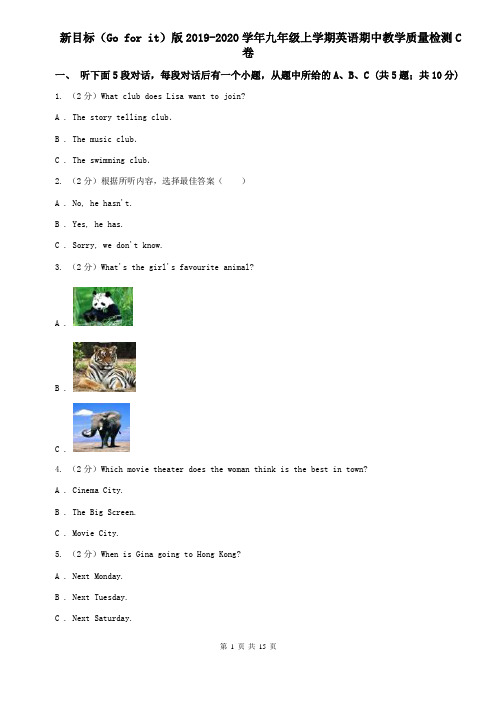
新目标(Go for it)版2019-2020学年九年级上学期英语期中教学质量检测C卷一、听下面5段对话,每段对话后有一个小题,从题中所给的A、B、C (共5题;共10分)1. (2分)What club does Lisa want to join?A . The story telling club.B . The music club.C . The swimming club.2. (2分)根据所听内容,选择最佳答案()A . No, he hasn't.B . Yes, he has.C . Sorry, we don't know.3. (2分)What's the girl's favourite animal?A .B .C .4. (2分)Which movie theater does the woman think is the best in town?A . Cinema City.B . The Big Screen.C . Movie City.5. (2分)When is Gina going to Hong Kong?A . Next Monday.B . Next Tuesday.C . Next Saturday.二、听下面2段对话,每段对话后有2—3个小题,从题中所给的A、B (共2题;共10分)6. (4分)听第一段对话,回答小题。
(1)What does Alice want to do with Andy this afternoon?A . To play sports.B . To visit museums.C . To watch movies.(2)What is Andy going to learn this afternoon?A . The piano.B . The violin.C . The guitar.7. (6分)听下面一段对话,回答问题。
新目标(Go for it)版2019-2020学年初中英语九年级上学期期中测试卷(一)A卷
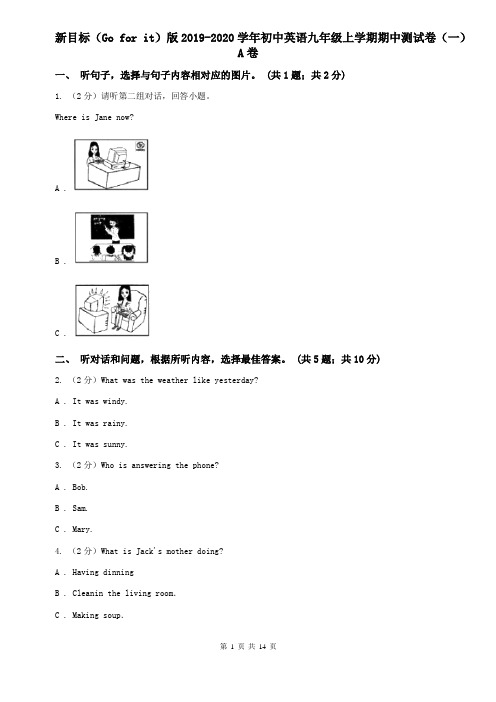
新目标(Go for it)版2019-2020学年初中英语九年级上学期期中测试卷(一)A卷一、听句子,选择与句子内容相对应的图片。
(共1题;共2分)1. (2分)请听第二组对话,回答小题。
Where is Jane now?A .B .C .二、听对话和问题,根据所听内容,选择最佳答案。
(共5题;共10分)2. (2分)What was the weather like yesterday?A . It was windy.B . It was rainy.C . It was sunny.3. (2分)Who is answering the phone?A . Bob.B . Sam.C . Mary.4. (2分)What is Jack's mother doing?A . Having dinningB . Cleanin the living room.C . Making soup.5. (2分)When can the boy play computers?A . On Mondays.B . On Wednesdays.C . On weekends6. (2分)What is the boy going to do?A . To see a movie.B . To help with the housework.C . To do some sports.三、听短文,根据短文内容判断下列句子正误。
(共1题;共10分)7. (10分)听下面一段独白,回答问题。
(1)When did Steven call Mary? (at 2:15 p. m. /at 8 a. m. /at 9:30 a. m.)(2)What does Steven ask Mary to do? (to call him back/to leave him a message/to buy him some tickets)四、听对话,根据对话内容完成下列句子,每空限填一词。
新目标(Go_for_it)版初中英语九年级(全一册)期中测试题2

九年级第一学期期中学业水平测试英语试题附参考答案和听力材料本测评卷分第Ⅰ卷(选择题)和第Ⅱ卷(非选择题)两部分,第Ⅱ卷即答题卷。
满分120分。
考试时间120分钟。
第Ⅰ卷(选择题共85分)一、听力部分(15分)(一)听句子选答语。
(5分)根据你所听到的句子,选择正确的答语。
每个句子读两遍。
1.A.By bike.B.By reading a lot.C.By the river.2.A.No, I don’t.B.Yes, I am..C.Yes, I did.3.A.They don’t agree.B.No, I don’t C.I agree.4.A.It must be Tom.B.It could belong to Tom.C.It might be OK.5.A.I’d get a pen for him.B.I’m going shopping.C.I’ve got a book..(二)对话理解。
(5分)根据你所听到的对话内容,选择最佳选项。
每段对话读两遍。
6.A.Swimming B.Dreaming.C.Driving.7.A.Pop music.B.Classical music.C.Country music.8.A.Mary’s B.Carl’s.C.Fred’s.9.A.To give her sister as a present.B.To give them to her mother.C.To get her ears pierced.10.A.She would go back to school.B.She would take a vocation.C.She would find another job.(三)短文理解。
(5分)根据你所听到的短文内容,选择最佳选项。
短文读两遍。
11.Carol is ______ this year.A.12.B.13.C.1412.Carol is good at English because ________.A.she has read many English booksB.she has joined an English language clubC.she has made vocabulary lists13.Carol goes to the club____________.A.on Monday eveningsB.on Friday eveningsC.at weekends14.Carol _______ at weekends.A.watches English moviesB.goes out with her friendsC.goes shopping with her mother15.Carol is allowed to ________ at night.A.watch TVB.write to her pen pals on the computerC.watch English movies二、选择题(30分)1.I have a lot of clothes _________.A.wash B.to wash C.washing D.washed 2.He is not __________to do his homework..So he always makes some mistakes.A.careful enough B.enough carefullyC.carefully enough D.enough careful3.Ann __________to choose her own clothes.A.allow B.is allow C.allowed D.is allowed 4.Jim works hard at his Chinese, and ___________.A.so Lucy does B.so is Lucy C.so does Lucy D.so Lucy is 5.I’m sorry , I _____ my pen at home.A.forgeted B.forgot C.left D.leaved 6.The box is __________heavy for me _________carry.A.too, to B.so , that C.too, too D.to , too 7._________ be a history teacher?A.Did she used to B.Does she use toC.Did she use to D.Does she used to8.In English , she’s _____ writing than listening.A.better at B.better in C.good at D.best in 9.He finds __________ easy to learn to dance.A.so B.it C.its D.that 10.Mr. Black isn’t here.He _________ to the library.A.has been to B.has gone to C.went to D.goes to 11.Our school is only a ________walk from her e.A.five-minute B.five minute’s C.five minutes D.five-minutes 12.I think we should learn English words by ________English songs.A.speaking B.singing C.saying D.telling 13.As time __________,We know each other.A.goes by B.passing by C.went off D.going by 14.Mom asks John to stay at home rather than _________ out.A.go B.going C.to go D.goes 15.------What are you going to do this Saturday?------I ________ yet.A.haven’t decided B.won’t decide C.am not decided D.didn’t deci de 16.If there are ______ trees, the air in our city will be _______ cleaner.A.less, more B.more, more C.more, much D.much, more 17.------ I’m sorry I broke the window.-------I’m afraid you have to______ it.A.look for B.pay for C.cut up D.ask for 18.What Tom did made his mother______.A.be angry B.to be angry C.angry D.to angry 19.--- Why ______ come a little earlier?--- All right.A.don’t B.not you C.aren’t D.not20----I feel tired and sleepy.-----Why not stop _______?A.resting B.relaxed C.to relax D.relaxing 21.I don’t know _______.A.where he lives B.where does he liveC.where did he live D.where he live22.If he _________ here next week, I ____there.A.will come, will to B.will come, to C.comes , will go D.comes , go 23.The chair is broken.Please ________ who broke it.A.look for B.find C.find out D.look at 24.As China grows stronger and stronger, Chinese _____ in more and more schools out of our country.A.teaches B.is taught C.has taught D.was taught 25.I _______ I ________ going to stay at home.A.don’t think, am B.not think ,am C.think, am not D.no think, am 26.Don’t plan _____ in downtown Singapore.A.to drive to B.driving C.on driving D.on drive 27.Yangling with her classmates________ going to the Great Wall.A.are B.is C.am D.be 28.Please_________ the old one away, _______a new one here.A.take, take B.bring, bring C.take, bring D.bring, take 29._________ hard w ork it is to plant so many trees around the lake.A.What a B.What C.What an D.how 30.Don’t worry.He is ______ to take care of little BettyA.carefully enough B.enough carefulC.careful enough D.enough carefully三、完形填空。
人教新目标(Go for it)版九年级英语上册 Unit 7 达标测试卷(含详细解答)

人教新目标(Go for it)版九年级英语上册 Unit 7 达标测试卷(限时: 45分钟满分: 100分)班级:姓名:得分:一、单项选择。
(每小题2分,共20分)1. —I think Amy's social life might get in ____ way of her study.—Probably. I will talk with her later.A./ B.aC.an D.the2. —It's difficult to get to the other side of the river.—I think a bridge ____ over the river.A.should build B.will buildC.should be built D.has built3. Oh, we have missed the last bus! I'm afraid we have no ____ but to take a taxi.A.idea B.decisionC.reason D.choice4. —According to the school rules, the students ____ get their ears pierced.—I think that's right. Students should pay more attention to their study.A.mustn't B.canC.needn't D.should5. The hotel we stayed in last night was ____!To start with, our room was too small.Then we found that the shower didn't work.A.awful B.wonderfulC.comfortable D.unlucky6. —Hey, Jason. Do you need a helping hand with the work?—I think I can ____ it myself. Thank you anyway.A.manage B.supportC.encourage D.refuse7. Lucy has had a bad cold. I regret ____ her to put on more clothes yesterday.A.reminding B.to remindC.not reminding D.not to remind8. I would be interested to see the pandas in the Wolong Panda Reserve, because itallows people ____ closer to them.A.get B.to getC.getting D.got9. —Have you heard about the traffic accident?—Yes. Luckily, nobody was ____ hurt.A.widely B.mostlyC.badly D.hardly10. —Mom, can I watch The Readers with you now?—____. But you can watch it after finishing your homework.A.Not at all B.No wayC.No problem D.Never mind二、完形填空。
新目标(Go for it)版2019-2020学年初中英语九年级上学期期中测试卷(二)(II )卷
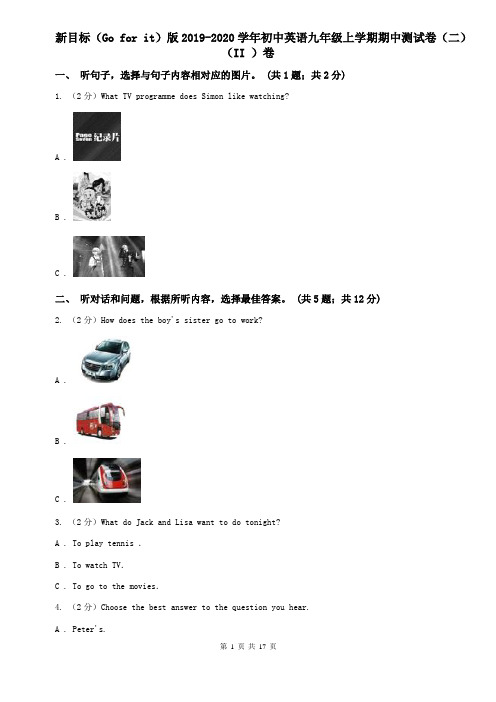
新目标(Go for it)版2019-2020学年初中英语九年级上学期期中测试卷(二)(II )卷一、听句子,选择与句子内容相对应的图片。
(共1题;共2分)1. (2分)What TV programme does Simon like watching?A .B .C .二、听对话和问题,根据所听内容,选择最佳答案。
(共5题;共12分)2. (2分)How does the boy's sister go to work?A .B .C .3. (2分)What do Jack and Lisa want to do tonight?A . To play tennis .B . To watch TV.C . To go to the movies.4. (2分)Choose the best answer to the question you hear.A . Peter's.B . Alice's.C . Kitty's.D . Jane's.5. (4分)听第六段对话.回答两个小题。
(1)What ale under Bob's chair?A . The red shorts.B . The black trousers.C . The blue socks.(2)How's Bob's room?A . Not big.B . Not nice.C . Not tidy.6. (2分)听对话和问题,根据所听内容,选择最佳答案()A . On Sixth Street.B . At the Fancy mall.C . On Seventh Street三、听短文,根据短文内容判断下列句子正误. (共1题;共8分)7. (8分)听短文回答四个问题。
(1)Who gave Anna the dog?A . Her grandma.B . Her neighbour.C . Her friend.(2)What colour is the dog?A . Brown.B . White.C . Black.(3)When does Anna walk the dog?A . In the morning.B . In the afternoon.C . In the evening.(4)How far is it from Anna's home to the park?A . 200 metres.B . 300 metres.C . 500 metres.四、听对话,根据对话内容完成下列句子,每空限填一词。
人教版go for it九年级英语 期中答案

期中检测卷第Ⅰ卷听力部分听力材料:Ⅰ.1.Jim often studies English by reading English newspapers.2.I love to watch the race on the Dragon Boat Festival; it is fun.3.How big the amusement park is! Let's go to Space World. I'm excited to try the rides.4.Mike used to be interested in scary movies. He always went to see one on weekends.5.We know tea plants are grown on the side of mountains in the south of China.Ⅱ.Text 1W: Hi, Mike. Let's go shopping this afternoon!M: What's up? I'm having fun playing computer games.W: Tomorrow is Father's Day. We'll buy our father a present.M: Oh, I see. But what present shall we get?W: What about a tie?M: No, he has a few. Mm, oh, his T-shirt has gone out of style. Let's get him one. All right?W: That's a good idea. Let's go now!M: OK.Text 2M: Look at all the girls around Bill. He's so popular.W: Yes. But he used to be quiet.M: You're right. His face always turned red when he talked to girls!W: I used to see him reading in the library every day.M: That's because he was a really good student. He studied hard and got good scores in his exams.Text 3M: What do you think of your English lessons, Mary?W: Well, I enjoy them. But they are not easy.M: What do you find difficult?W: Lots of things, especially grammar. I've learned many grammar rules, but I still makemistakes in my homework.M: Do you read much in English?W: Not much. I like doing English exercises better.M: Don't just do exercises. You'd better learn grammar rules by reading.Text 4W: Excuse me, can you tell me where I can buy some food?M: Sure. There is a supermarket in this shopping center.W: Oh, could you please tell me how to get there?M: Yes. Go to the second floor and then turn right. Let's see... Um... it is next to a bookstore.W: Thanks. Do you know when the shopping center closes today?M: It often closes at 10: 00 p. m. on weekdays. But it closes half an hour later today because it's the weekend.W: OK, thanks a lot.M: You're welcome.Text 5M: I heard you've got a new job in New York City. Congratulations!W: Thanks.M: Will you still work as a nurse?W: No. My new job is teaching French in a language school.M: I didn't know you could speak French. When did you learn it?W: I learned it four years ago. My grandma taught me. She used to be a French teacher when she was young.M: How long do you plan to work in New York City?W: For about two years. Then I'll come back. All my friends are here, you know.M: I'm sure you'll make some new friends there.Text 6W: Hey, Jason. What is it in your hand?M: A sky lantern. I bought it from the store across from our school.W: It's not a festival today, is it?M: No, it's my sister's birthday today. She and I will send out the sky lantern tonight.W: Wow, that's a good idea. Your sister can make wishes to the sky.M: Yeah, people used to send sky lanterns out to ask for help when in trouble, but now sky lanterns are used to make wishes. Do you want to join us tonight, Kathy?W: Yes, I'd love to. When will you start to send out the sky lantern?M: At 8: 00 p. m.W: Oh, it's still early. I'll go home first to repair my brother's model plane.M: What happened?W: My brother dropped his model plane and broke it. He is upset.M: Hey, take your little brother with you tonight. It would cheer him up a bit.W: Can I? Oh, he must be happy. Thanks.Ⅲ.At the Smithsonian American Art Museum in Washington, D. C.,you might see two shoes. They are painted with clouds and stars. They look like shoes that you could wear on your feet. But they are really made out of carefully formed clay material. The artist William Wilhelmi made them. W Studio is on a quiet street in Corpus Christi, Texas. This is where William makes his art. He says working with clay can be difficult. But he says it is also very pleasant. And it allows him to use his sense of color and shapes in many ways. He finds new ideas by traveling and reading books.听力答案:Ⅰ.1~5:BACCBⅡ.6~10:ABBCC11~15:AABCB 16~20:CBABCⅢ.21~25:CBBAC第Ⅱ卷笔试部分Ⅳ.26.C27.A点拨:考查it作形式宾语。
- 1、下载文档前请自行甄别文档内容的完整性,平台不提供额外的编辑、内容补充、找答案等附加服务。
- 2、"仅部分预览"的文档,不可在线预览部分如存在完整性等问题,可反馈申请退款(可完整预览的文档不适用该条件!)。
- 3、如文档侵犯您的权益,请联系客服反馈,我们会尽快为您处理(人工客服工作时间:9:00-18:30)。
人教新目标(Go for it)版九年级英语上册期中达标测试卷(限时: 45分钟满分: 100分)班级:姓名:得分:一、单项选择。
(每小题2分,共20分)1. —How should I improve my spoken English, Mr Han?—____ following an English app on the smartphone.A.For B.ByC.With D.In2. —I don't know how to use the app Fun Dubbing.—Ask Kitty for help. She has lots of ____ in doing it.A.expression B.experimentC.examination D.experience3. [易错题]The ____ you take your study, the ____ grades you will get.A.serious; goodB.more serious; betterC.seriously; goodD.more seriously; better4. —Do we have to read anything next week, Mr Wu?—Sure. You ____ to read Black Beauty from Pages 58 to 85.A.were expectedB.will expectC.are expectingD.are expected5. [易错题]—I ____ meeting Jack today because I am still angry with him.—Come on, Mary. You are good friends.A.avoid B.requireC.enjoy D.expect6. —Does your sister spend her money ____?—Yes, of course. She knows what to buy and what not to buy.A.quickly B.wiselyC.badly D.simply7. —Jason, how do you keep fit these days?—I do exercise every day and I can eat what I want, but I never ____ weight.A.put on B.put offC.put up D.put away8. —How do you spend your free time after doing homework on weekends, ZhangMing?—I ____ play computer games at home, but I ____ studying on the app now.A.was used to; am used toB.used to; am used toC.am used to; used toD.used to; use to9. —Wow, your dress looks so beautiful. Can you tell me ____?—Oh, I bought it in an online store.A.when do you buy itB.how do you buy itC.where you bought itD.how long you have had it10. —Mum, I've got the first prize in the final exam.—____,my girl!A.Well done B.Best wishesC.Good idea D.I'm afraid not二、完形填空。
(每小题2分,共30分)Karl Marx was born in Germany on May 5th, 1818. __11__ he was a child, he was forced to leave his country again and again. He lived in Belgium, England and some other __12__.His mother tongue was German and at school he __13__ French and English, but he felt his English was poor, so he __14__ up his mind to improve his English. He began to work hard __15__ it. He made so much progress __16__ he could soon readEnglish newspapers and write English articles.However, there were __17__ things that he thought were too difficult for him—the grammar and some of the idioms (习语). He often encouraged himself by saying “__18__ I keep on trying, I'll make even greater progress.” At the same time, his close friend, Engels, often wrote to __19__ him for his hard work in learning English.In one of Marx's books, he gave people who were learning a foreign language some __20__ on how to learn it well. He said a foreign language was necessary for a person to have a __21__ future. He said a person should translate every word he heard into the foreign language he was learning. If he could do this, it would be __22__ for him to use the language freely.In April, 1841, he __23__ his doctor's degree. After that, he began to write articles for a newspaper. He wrote about the housing problems of poor people and their hard life. __24__ he tried, he did his best. During the 1840s, Marx and Engels wrote a book together. These words of theirs became very __25__:“Working people of all countries, unite(联合)!”11. A.When B.BeforeC.After D.While12. A.farms B.factoriesC.schools D.countries13. A.has learned B.was learningC.learns D.learned14. A.had made B.makesC.made D.was making15. A.on B.atC.in D.for16. A.that B.whatC.when D.how17. A.one B.twoC.three D.four18. A.But B.IfC.And D.As19. A.praise B.askC.help D.call20. A.examples B.meaningsC.money D.advice21. A.good B.betterC.well D.worse22. A.probably B.impossibleC.possible D.perhaps23. A.gets B.receivesC.has received D.received24. A.Whoever B.WheneverC.Whatever D.However25. A.humorous B.understandingC.similar D.famous三、阅读理解。
(每小题3分,共30分)ACelebrated on April 22 each year, the Earth Day draws attention to the need to build a healthier planet. How can you help? Take the following actions.26. The underlined word “them” refers to “____”.A.food products B.green products C.plant products D.plastic products 27. What do we know about plant-based meals?A.They taste really delicious.B.They're necessary for our body.C.They're good for the environment.D.They need a lot of time to prepare.28. The Global Earth Challenge app allows people to ____.A.take cooking lessons for freeB.learn to use recycled materialsC.search for fun ideas of making toysD.know about environmental problems nearby29. The last action is calling us to ____.A.use recycled materials creativelyB.develop healthy eating habitsC.take on the Global Earth ChallengeD.stop using plastic products at home30. What's the reading mainly about?A.Why the Earth Day becomes popular.B.Why we should care for our planet.C.How to make the Earth Day popular.D.How to help build a healthier planet.BFan Shenghua is one of the inheritors(继承人) of West Lake Longjing tea roasting technique(炒茶技艺). He has been making Longjing tea for more than forty years.Longjing tea leaves are famous for their color, taste and shape.“You have to touch the leaves with your hands to feel how much water is being removed(去除),” Fan said. “If too much is removed, the leave s will break into pieces; if not enough is removed, the tea will taste bitter(苦的).”This traditional technique dates back to the Ming and Qing Dynasties. It not only makes the tea taste good, but has also become an important part of Chinese tea culture.Th ese days, however, more people are using machines to do the job. “It's easier, but the quality is not as good,” Fan said. “Machine-made tea floats longer in water and tastes bitter.”In March this year, when a leader visited Hangzhou, he watched Fan roast tea. Fan changed the strength and movement of his hands as he roasted leaves. The leader later said, “The things made by two palms(手掌) cannot be replaced by modern technology.”Fan is now teaching some young men. His son, a 27-year-old college graduate, is one of them. “It's a tradition. We need to pass it down,” he said.31. According to Paragraph 3, what will happen to tea leaves if they have too muchwater?A.They will go bad quickly.B.They will break into pieces.C.They will lose their fresh taste.D.They will have a bitter taste.32. What does the underlined part “This traditional technique” refer to?A.Picking tea leaves.B.Roasting tea leaves by hand.C.Drinking tea in a traditional way.D.Growing tea plants on the mountains.33. What does Fan think of making tea by machine?A.It is easier than by hand.B.It has a long history in China.C.It makes tea taste better and better.D.It becomes an important part of tea culture.34. What can we learn from the last paragraph?A.Fan's son studies tea culture in college.B.Fan will open his own tea houses in China.C.Fan's son is learning the tea roasting technique.D.Fan is making this technique popular worldwide.35. What does the passage mainly want to tell us?A.How to tell good tea apart from bad tea.B.Longjing tea leaves are the best in the world.C.How tea is packed and sent to many different countries.D.Sometimes only by hand can we make the best of the things.四、短文填空。
